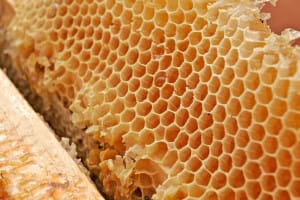Teen beekeeper Orren Fox knows that the key to delicious food is quality ingredients.
Rodale News
by Ramin Ganeshram
 |
Licensed under GFDL 1.2 via Wikimedia Commons |
Adapted from FutureChefs
For some young cooks, preparing food is as much about a social message as it is about the flavors and composition of the dishes themselves. Add to that list Orren Fox of Massachusetts, who first became interested in the plight of farm animals before he was 10 years old.
“Bees are critical to one-third of everything we eat with their pollination,” he says. “The honey is absolute gold. It requires so much work to collect a single teaspoon of honey.”
Not all honey is what it seems. Often the commercially available honey sold in most supermarkets is “ultrapurified,” a process that removes much of the pollen deposits that honey aficionados consider desirable. Orren offers these 6 Do’s and Don’ts when buying honey:
DO buy honey from a local producer who sells raw honey. This will have the highest local pollen content, which many consider integral to honey’s health benefits.
DON’T bother to look for “grades” of honey, the way you would with maple syrup—it’s not labeled in that way.
DON’T be surprised if your honey has large crystals; this is common in raw honey.
DO use pasteurized honey for children, seniors, those with immunity issues, or pregnant women.
DO use pasteurized honey for cooked preparations and save the raw for drizzling and maximum taste impact.
DO ask your beekeeper about the nectar sources for his or her bees because this will impact taste. Keep notes on which flower-source honeys you like best, for future reference.
Check out this full profile on Orren and try his delicious honey-toasted carrots recipe.

